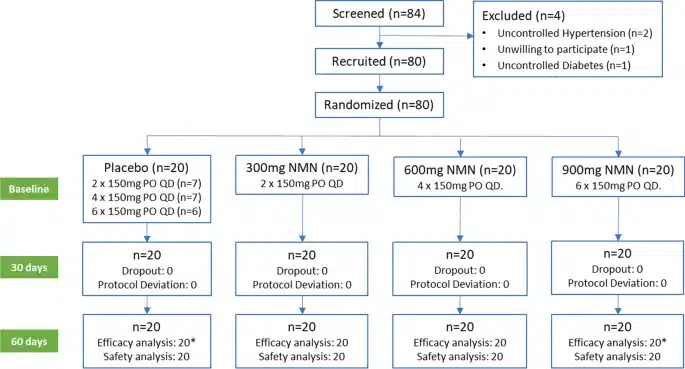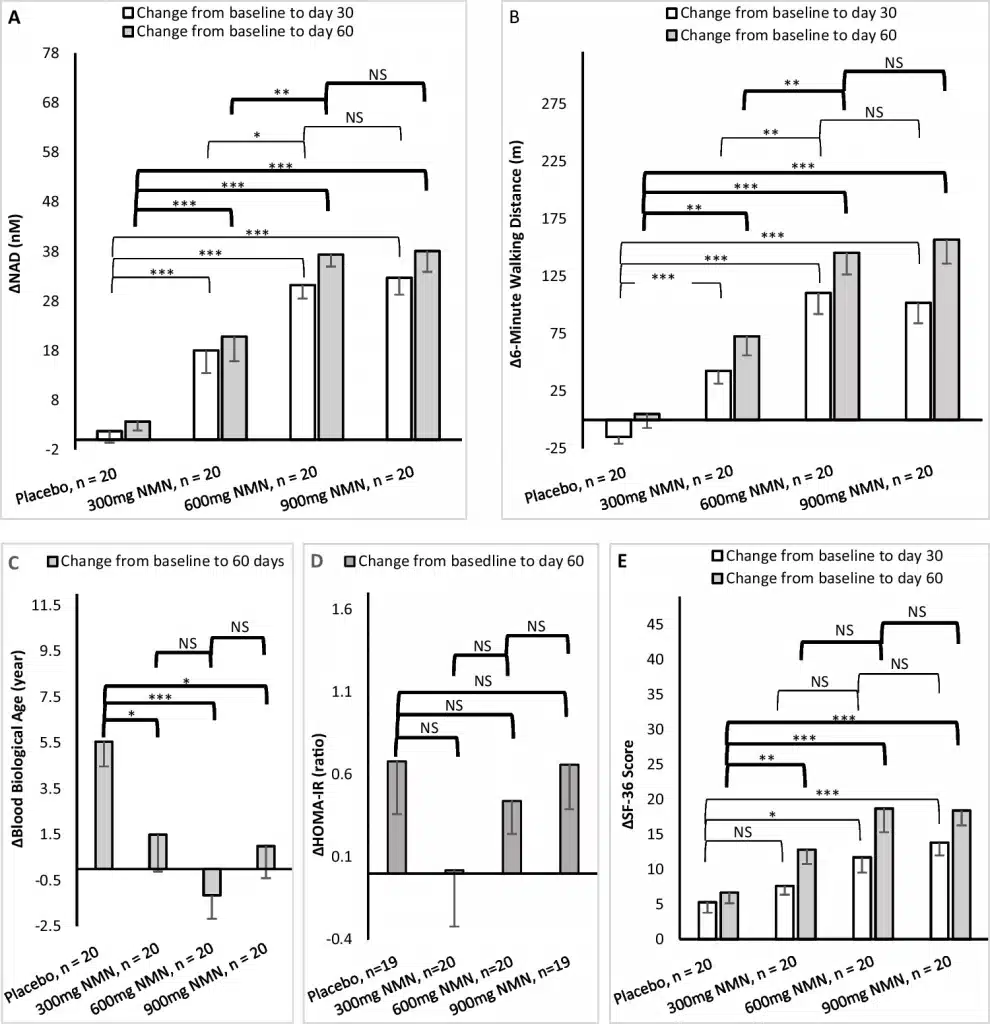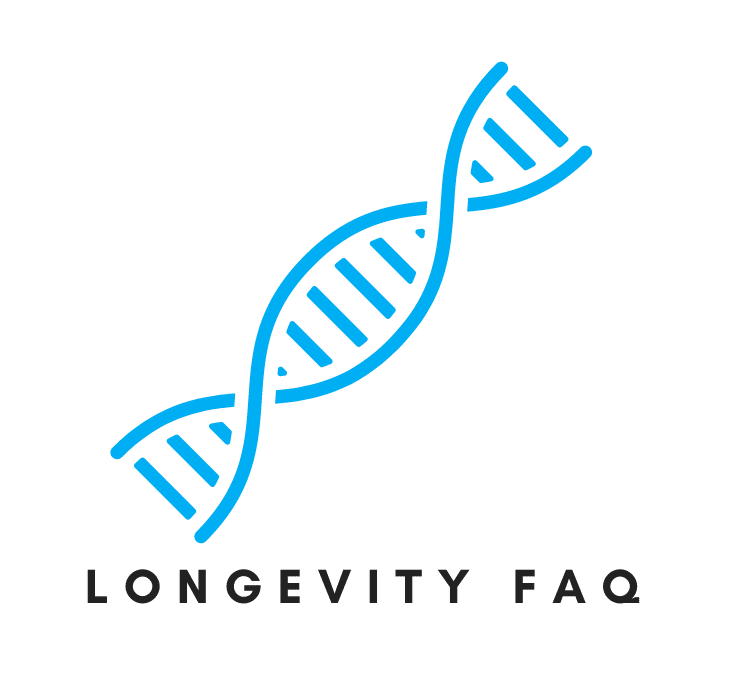Table of Contents
Understanding the impact of certain natural compounds on our health can often lead to breakthroughs in how we approach well-being and aging. One such compound, β-Nicotinamide mononucleotide (NMN), has recently been under the lens of scientific scrutiny. Let’s take a closer look at a recent clinical trial examining NMN’s effects on healthy middle-aged adults. The trial titled The efficacy and safety of β-nicotinamide mononucleotide (NMN) supplementation in healthy middle-aged adults: a randomized, multicenter, double-blind, placebo-controlled, parallel-group, dose-dependent clinical trial was published in December 2022 funded by Aba Chemicals Co. (Shanghai, China) and Abinopharm, Inc. (Connecticut, USA)
Purpose of NMN Trial
NMN, or β-Nicotinamide mononucleotide, is a naturally occurring compound found in several plants. This compound plays a pivotal role in boosting nicotinamide adenine dinucleotide (NAD) levels within our bodies. To put this into plain English, think of NAD as a crucial helper molecule in our cells, assisting in producing energy and regulating other cellular functions. As we age, NAD levels drop, potentially impacting our health and vitality.
The main aim of this clinical trial was to see if supplementing with NMN could:
- Boost NAD levels in the bloodstream
- Enhance physical performance
- Preserve the “biological age” of the blood (basically, markers in our blood that give clues about our internal aging process)
- Influence insulin resistance (when our cells don’t respond well to insulin, which can be a precursor to conditions like diabetes)
- Impact overall health
NMN Trial Details and Dosages
Who Were the Participants?
- Total of 80 healthy middle-aged adults participated.
- They were aged between 40-65 years, with an average age of roughly 49 years.
- The group comprised 59% females and 41% males.
How Was the Trial Conducted?
- This was a rigorous study, meaning it was randomized, multicenter (conducted at several centers), double-blind (neither the participants nor the researchers knew who was receiving the NMN or a placebo), and placebo-controlled.
- Participants were divided into four groups. Each group either received a placebo or one of three different NMN dosages: 300 mg, 600 mg, or 900 mg.
- They took these capsules orally, once a day before breakfast, for 60 days.
- Key parameters, such as NAD levels, were checked on days 0, 30, and 60.
- Their physical performance was gauged using a simple test: how far they could walk in 6 minutes.

Results of NMN Trial
NAD Levels:
- There was a noticeable rise in blood NAD levels in all NMN groups on days 30 and 60, especially when compared to those on the placebo.
Safety:
- NMN was found to be safe even at the highest dosage of 900 mg daily.
- No one experienced any adverse reactions related to NMN, and everyone completed the trial.
Physical Performance:
- Those taking 600 mg and 900 mg NMN notably improved their 6-minute walking test scores.
- A slight improvement trend was observed in the 300 mg group by day 60.
- The placebo group didn’t see any change.
Blood Biological Age:
- Those on NMN managed to keep their blood’s biological age stable. Conversely, the placebo group saw an increase during the trial.
Insulin Resistance (HOMA-IR Index):
- No major changes for the placebo and 300 mg groups.
- The 600 mg and 900 mg groups experienced an increase in the HOMA-IR index.
Overall Health (SF-36 Questionnaire):
- All NMN groups reported improved overall health scores by day 60, with the 600 mg and 900 mg groups also seeing benefits by day 30.

Conclusions and My Thoughts
Based on the trial’s findings:
- NMN does a promising job in elevating blood NAD levels.
- Doses up to 900 mg/day appear safe and don’t produce any unwanted side effects.
- Physical endurance and overall health improvements were especially notable with the 600 mg dose.
Implications for Longevity and Health: This trial suggests NMN could play a role in promoting healthy aging. The ability to improve physical performance and maintain blood biological age might have implications for longer, healthier lifespans.
For Those Interested in NMN:
- If considering NMN supplements, always consult with a healthcare professional first.
- More research is required, especially over longer periods, to fully understand NMN’s long-term effects.
- The 600 mg dose might be the “sweet spot,” but individual needs can vary
- This result in inline with many of the dosages that have been shared with me for pepole using our NMN dosage calclator showing that you don’t need to use a super high NMN dosage of 1,000 mg, dosages around the 500mg level are providing an adequate boost to NAD. Why not give our calculator a try!
How to get more information on NMN?
We have created for you many resources to help you on your longevity and NMN jouney, the below articles will help you make informed decisions, take a read and let us know any questions and thoughts on in the comments:
- NMN Dosage Calculator
- How to store your NMN
- What is the Recommended Dosage of NMN to Optimize Health and Longevity?
- The Ultimate NMN Supplementation Guide What are its Benefits, Side-Effects, Dosage & Cost?
Finally, while these findings are promising, always remember: supplements are just one piece of the puzzle. A balanced diet, regular exercise, and other healthy lifestyle choices remain crucial for optimal aging.

Didi this study include TMG as a precursor, or not ?
Also good to alert those who shld not take nmn.
Did the human studies include TMG as a precursor?